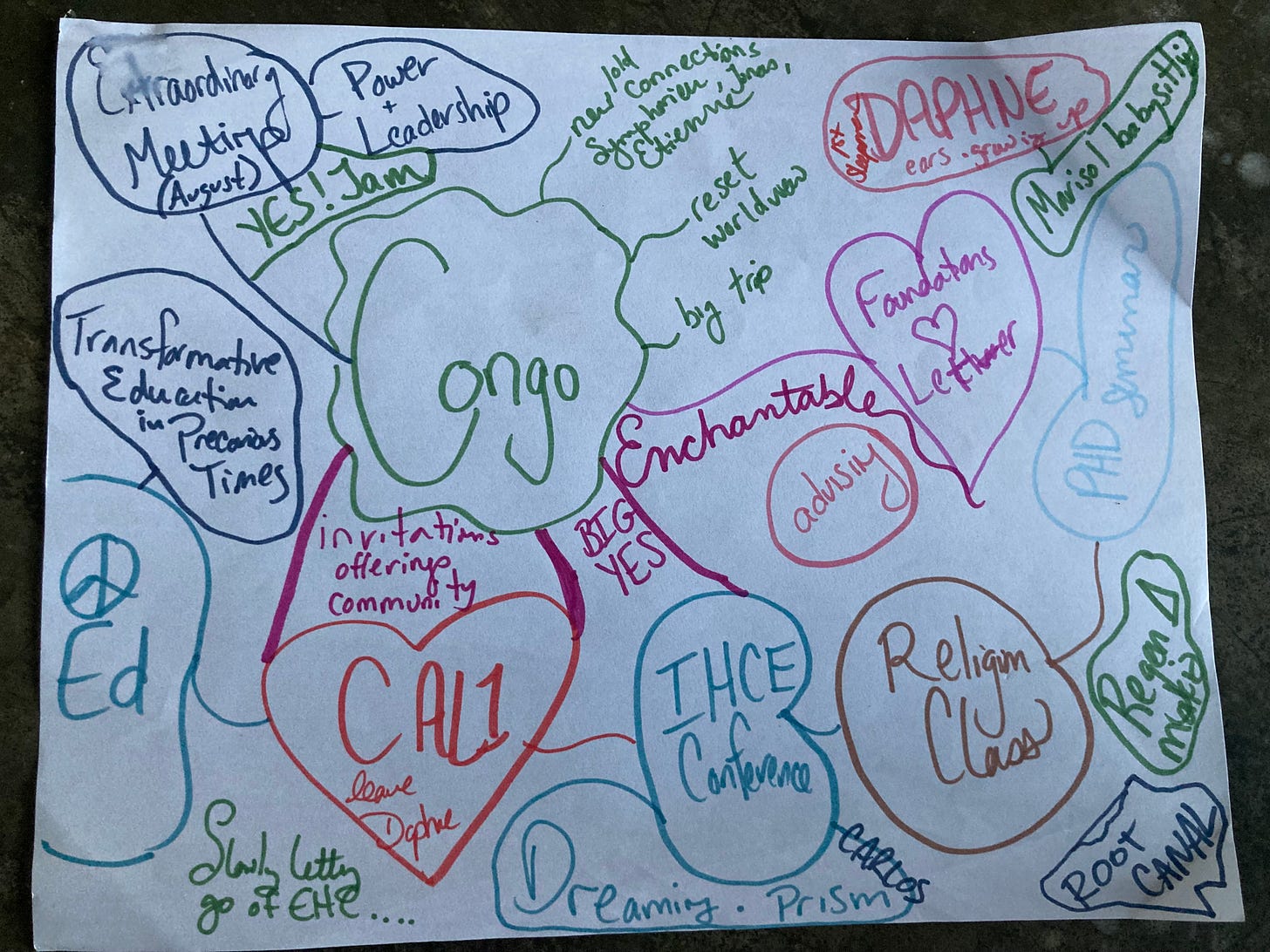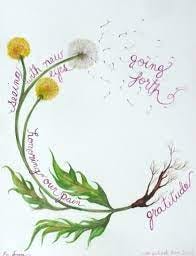“What surprised you today?
What touched you today?
What inspired you today?”
-Rachel Naomi Remen, Education for Mission, Meaning, and Compassion, an article I am using in my online course, Transformative Education in Precarious Times. She suggests that medical professionals in her courses reflect on these questions each day to grow in their self-awareness and compassion. The questions in the image are with my additions.
What a journey these past few months have been.
Last week, I guided students through an end-of-semester reflection exercise that I would like to share with you today, dear readers. It was for our critical seminar session, which is a time for students to self-reflect on their learning, make connections across courses, and between what they’re learning in class and their lives. It is also a chance for our whole department to be together and create cohesion and community. I am sharing the exercise as shared with the students, but it could easily be adapted for your life if you are not currently a formal student (looking at the past season, for example, instead of the semester, or a recent milestone/beginning in your own life - always a student, though! :).
The end of the calendar year is a reflective time for me, and I will be sharing more about my process and providing more exercises and materials in the coming weeks for paid subscribers. If you would like to join us, please consider upgrading your subscription!
We started with a guided centering and visioning, which I will include here as a recording.
I then invited them to explore these themes through their head, heart, hands, home* , either by
staying with the meditative tracing of their journey from the beginning of the semester, and begin to write or draw what came up in the meditation, or
focusing on this moment as a starting point, and using the following questions as a guide:
Head: What are you thinking about these days? What is occupying your mental energy? What questions are you holding? What have you learned this semester that is sticking with you? What are you unlearning?
Heart: How is your heart? What has your heart been holding? What has your emotional landscape been like this semester? What is present in your emotional landscape now?
Hands: What have you been doing? How are you spending your time? What have you been practicing?
Home: How are your relationships? With classmates, friends, this place, Costa Rica? With loved ones far away? How are you managing relationship dynamics? Your relationships not just to other people, but also this place, more-than-humans, the unseen?
(Note: the category home was my attempt at aliteration - I love aliteration - to encompass relationships, though if you think of another H word, let me know! I think home works if we think of it in an expansive way, how we are at home in the world, through our many relations at all levels).
The invitation is to write, draw, or otherwise express your responses to these prompts. Whichever ones grab you, go with that - or just allow the space to evolve on its own.
For educators who might want to try this with students: after students reflected on their own for about 20 minutes, we had them move into trios to share for about 30 minutes, and then did a large group debrief. Our closing circle prompt was: “What is something you are grateful for this semester? What is something you are proud of?”
When I did the reflection for myself in class, I started mapping my journey of the semester, since August, which involved many literal journeys across the world. I mainly mapped the things that happened, the things I did:
The emotional landscape would be another layer, as with each bubble there were whole emotional journeys involved.
My overall noticing in my own reflection was how much output, how much doing i have been engaging. And how much teaching. Multiple courses and conferences across languages and continents (Central America, South America, and Africa). It has been an incredibly rich time. I am also grateful for less doing in the next month or two, more being, and hopefully, lots of time for processing, reflecting, writing, and sitting.
When I did the exercise again just now as I’m sharing it with you, this is the diagram that emerged. I freewrote in each section. What I noticed most of all is that reflection takes space, and that the space is so worth it. I have not had much space for reflection these past months, but I am slowly settling, and sliding into the slower speed that the next weeks are inviting me into. Decelerating. I know when we guide students with these exercises, what I hear the most is, “Thank you for this space.”
Reflecting brings me peace and joy, and I feel so content sharing these processes with you!
This week was Thanksgiving in the US, which is also the National Day of Mourning, and is an important reflective time for considering our respective roles in ongoing colonial dynamics, and how we can contribute to healing, reparations, and justice for Indigenous people, and move towards better relations.
I didn’t celebrate Thanksgiving, as I am in Costa Rica and it is not celebrated here, so it wasn’t a stretch. It was like any other day. I taught class. Like many, I have a fraught relationship with the holiday, and always struggle with how to celebrate it or mark it. I want to celebrate gratitude and abundance and being with family and friends, but also reject the false colonial narratives of the holiday and abhor the genocide it is rooted in. And yet I still wanted to mark it, to honor it more in the spirit of mourning and recognition of ongoing Indigenous struggle, ever present as we watch settler colonial violence rage in Gaza. Two things I did do to honor the day were:
Read from Becoming Kin by Patty Krawec, a book I highly recommend
Financially support Indigenous creators who I learn from on social media, in the spirit of micro-reparations.
How do you honor the complexity of this day?
A few weeks ago, I shared about a teaching from Joanna Macy about honoring our pain for the world. This week I have been thinking about her teaching on gratitude as a revolutionary act. Joanna talks about how, in the face of capitalism and scarcity thinking, gratitude is radical. It’s saying I am enough. What I have is enough. We are enough. You are enough. In a culture that tells you that you have to buy more to be enough, and that you never have enough, this is indeed radical.
Gratitude is at the heart of most Indigenous cosmologies and cultures. Robin Wall Kimmerer - mother, scientist, author, professor, and enrolled member of the Citizen Potawatomi Nation - talks about the revolutionary nature of gratitude, and the first four minutes of this video share some of her teachings from her book Braiding Sweetgrass:
Side note: Milkweed Publishing, who published Braiding Sweetgrass, has many additional resources for the book on its web site, which is where I found this video. I highly recommend checking out, whether you are a fellow adorer of this book or haven’t read it yet (maybe this will make you want to :)
When I look back at the semester map, I have so much to be grateful for. Safe travels, meaningful work, heartfelt connections, living dreams, living in a place of relative tranquility and abundance. Counting among my blessings you, dear readers. Thank you for being here, truly! I welcome and invite you to share any reflections on these exercises in the comments below, or over email.
With love, gratitude, appreciation, and care,
Stephanie
PS - I share my gratitude playlist periodically, and share it with you again here :)

*Head/heart/hands was a framework shared with me last year by one of my peace education students - I think it was Brianna- and how they think about lesson planning (engaging head, heart, and hands in each lesson). Thank you! :)










